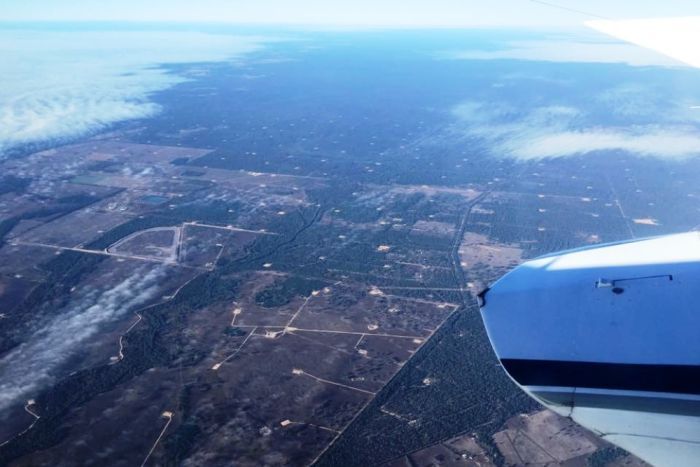
CSG not a major factor in federal election
Posted
Coal seam gas (CSG) has figured large in state elections, but it is making little impact on the national stage.
However, that is not putting off minor parties and independents campaigning strongly on the issue in seats like New England, where CSG is a key part of the trail for local candidates.
Audio:
Graziers Richard Golden and Brett Griffin share their stories about living with CSG
(ABC Rural)
In Queensland’s Surat Basin, graziers and farmers have been living with coal seam gas on their land for some time and their experiences are all unique.
Richard Golden and his wife Helen live at Potters Flat, west of Wandoan in south-east Queensland, known as a ‘sweet spot’ for CSG.
Their beef cattle property is home to 88 operating CSG wells with the potential for a further 31, but despite the outward success of co-habiting alongside gas companies, the Golden family said the relationship had certainly had its moments.
“I know that it is possible to coexist in a gasfield and I know it is possible to coexist while a gasfield is being constructed,” Mr Golden said.
“I know that they can’t keep noxious weeds out. We’ve had a light up of our next door neighbours with [declared weed pest] Parthenium.
“I know that they can’t get their contractors to close gates because we had gates left open all the time.
“It is mostly the stuff that is pretended that we know can never be delivered, that is the thing that bites with us, not so much that their activities are going to disturb our cattle. We know they’ll disturb our cattle.”
Two properties away, Brett and Diane Griffin live at Sydeva north of Yuleba, where there is a staggering 120 wells and potential for more.
Mr Griffin said he ran beef cattle on his family property and his family had nearly notched up a century there because he was the third generation.
He said he had been initially angry that there was gas on his place, and at one point in the construction phase was seeing 250 cars per day on the family’s land.
“It didn’t start off very well. It’s a big pill to swallow and you get a map with 120-odd wells on it that are going to come onto your place,” he said.
“I was pragmatic enough to know that I wasn’t going to stop it.”
State Government should be largely responsible for CSG activities
Mr Golden said he strongly agreed the landholder was responsible for what were critical negotiations, but said the State Government must play its part.
He said he had serious reservations about changes made to Queensland legislation, particularly changes to exclusion zone distance.
He also wanted more onus to be on CSG companies during preliminary activities, suggesting an enforceable conduct agreement during that early stage be mandatory.
On the question of whether the rules surrounding the industry needed to be at a state or federal level, Mr Golden was clear.
“We’ve argued hotly for decades that resources issues should be dealt with by state legislation and by state governments,” he said.
“I think the idea that the Federal Government should be called on to come in over the top is just a bloody cop out.”
Back at Mr Griffin’s place, he said he was pleased with the level of monitoring, especially of the underground water, but said negotiations between the landholder and the CSG company were vital.
He said he had taken two years to negotiate his rights and what was expected of the company.
“Your whole future depends on it. I’ve actually publicly stated that it’s the biggest poker game you’ll ever play, and you must get it right,” Mr Griffin said.
Both men acknowledge getting legal advice at some point of the negotiations is essential.
Industry still deeply divides Surat Basin community
The two graziers agree that while a few people are satisfied with the monitoring of wells, underground water and exploration on their land, the issue still deeply divides the community.
Mr Golden conceded there was still a long way to go, and landholders must be vigilant and always keep tabs on the situation on their country.
“It is up to us. There’s no free lunch and if you don’t have a reasonable case to argue, then you are not going to get anything outstanding,” he said.
“We know our land as well as anybody knows it and we have the vested interest in that.”
Mr Griffin said given the choice, even with the benefit of hindsight, he felt on balance his relationship with CSG companies had been positive.
“I hear people say, ‘What about the future for our children?’ and there’s a lot of angles to that,” he said.
“But all I can say to that is that if it turns up and you get in and get your kids in on the field, they will have a future.
“They won’t be reliant on the weather like we usually are. That’s a big plus.”
Mr Griffin said that while there were sensational stories about CSG in the mainstream media, there were different opinions from people who had lived in the heart of the gas fields.
“There’s landholders that have said to me, ‘Gee I wish they’d find gas on my land’, because they’ve seen other people do well out of it and become drought-proofed, and of course there are those who wouldn’t have it at any cost,” he said.
Topics:
business-economics-and-finance,
